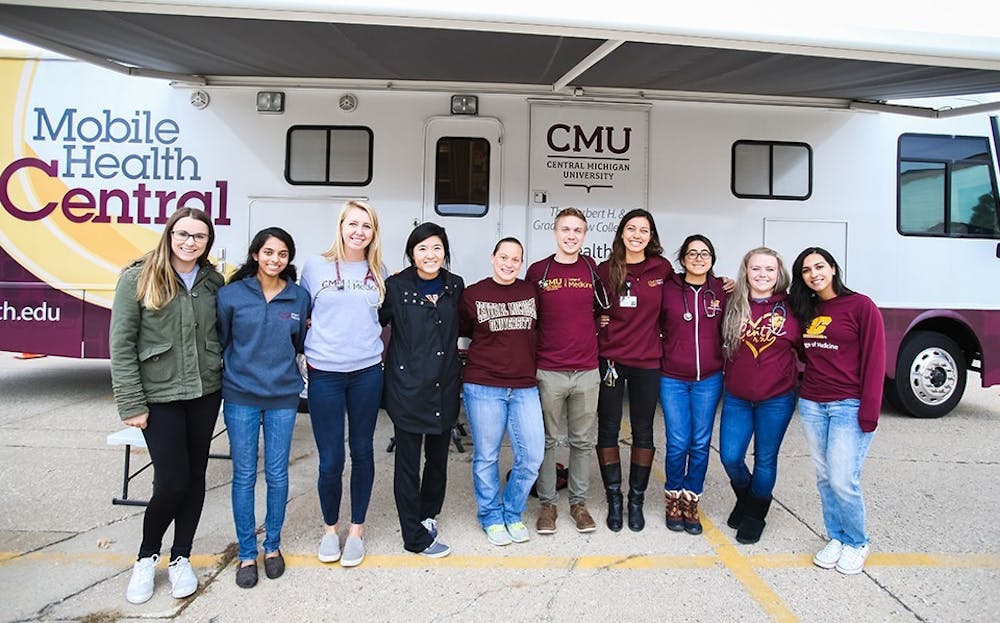Taking medicine to the streets
College of Medicine students offer free primary care to the homeless and underserved

Members of the CMU Street Medicine team pose for a photo in front of the College of Medicine mobile health clinic bus. (Courtesy Photo | University Communications)
Since September, a group of students from Central Michigan University’s College of Medicine has been providing free primary care for the homeless and underserved in the Mount Pleasant area.
This group is called CMU Street Medicine and was founded by Samuel Jackson, a fourth year medical student from Harbor Springs.
This idea originated from Jackson’s experience this past summer when he worked in Pittsburgh for the Street Medicine Institute, the first organization designed to provide this type of care. He wanted to take part in this program after hearing Jim Withers, the creator of the Street Medicine Institute, give a talk at CMU during Jackson’s second year in medical school.
“The whole idea of the (street medicine) model is to bring medical and social services to people experiencing homelessness exactly where they are, in their reality,” Jackson said.
In Pittsburgh, Jackson went out with his teammates and a duffel bag full of medical supplies. Bringing this idea back to CMU, Jackson brought his own spin on street medicine.
CMU Street Medicine holds their events at the Isabella County Restoration House, using the College of Medicine’s mobile clinic van. While the team sets up at the homeless shelter, the organization welcomes all members of the community.
“We’re open to all people. You don’t have to be homeless; you don’t have to not be able to go to a doctor,” said Bad Axe second-year medical student Whitnee Essenmacher. “If you have a medical issue, and you need to be checked out, our doors are open to anyone.”
The team of students, along with a nurse practitioner and a worker from Community Mental Health, provide a variety of services for these patients, including assistance in getting health insurance, referrals to doctors, resources for mental health issues, low-cost vaccines and prenatal care. For example, Isabella Citizens for Health is a hospital that will take any insurance or the uninsured, so the students will refer patients to this hospital.
At their first event held in September, the team only had one patient the entire time, said Minneapolis second-year medical student Christal Clemens. Since September, their patient following has grown.
Now, patients range from kids to the elderly, and are made up of all different races with diverse backgrounds and family dynamics, Essenmacher said.
While students at CMU may not witness homelessness every day, care for the underserved and homeless is crucial in this area.
“(Homelessness) looks different depending on where you are,” Clemens said. “In the city, you’ll see homeless people on the sidewalks asking for help, asking for donations, but here I think it’s harder because we don’t see a lot of people on the corners asking for things like that.”
One memorable patient that Jackson helped was an individual that was new to the area with her partner. The couple had moved here with very little money and were homeless. On top of that, this patient was pregnant.
Jackson said she wanted care and housing and was extremely grateful for the help of CMU Street Medicine. The organization was able to get her prenatal vitamins and appointments with an OBGYN. Moreover, the couple landed with their feet on the ground and now have housing and a job again.
“It’s lot of effort and a lot of people who aren’t sometimes wanting care, and that’s totally fine, but then there are these little gems of people like her and it’s like ‘well, even if I help this one person, it’s all worth it,’” Jackson said.
Similarly, Clemens shared that many times these people end up homeless because someone lost a job, or there was some internal family conflict.
“You can’t really stereotype any population that we are serving," Clemens said. "People come from all different backgrounds. It’s not the classic ‘oh, they’re drug addicts; they’re alcoholics.’ They’re not.”
Currently, CMU Street Medicine is running on donations and a small starter fund from the College of Medicine. However, in order to get the supplies they need, such as vaccines, and to grow as an organization, they need more money.
The team said they are applying for a grant, but mostly rely on donations. To donate to this cause, individuals can send checks to CMU’s College of Medicine with an attention notice to CMU Street Medicine or donate on their Go Fund Me page: https://www.gofundme.com/cmu-street-medicine.






